Plot
When a family misses the rendezvous for a wagon train they venture on their own to join it. They are ambushed by three outlaws who murder the father, knock out the mother and steal one of the two boys for themselves.
As the years go by, the remaining brother, Clint, and his mother, are looked after by others in the community with Clint making a living breaking and selling horses while the kidnapped brother Asa becomes an outlaw known as Ace Carter, presumably under the tutelage of his kidnappers. When the Pony Express is created, both brothers, their relationship unknown to each other, attempt to join as riders. Clint is accepted for the most dangerous route whilst Ace is rejected. Ace revenges himself by robbing the mail from his brother, and by robbing a stagecoach. The robbery of which Clint is suspected. Clint tracks down Ace and discovers him to be his long-lost brother. And when townsmen arrive to "string up" Ace for the robbery, Clint faces a tough choice.
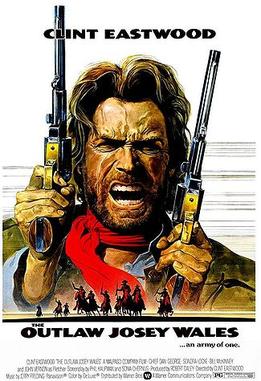
The Outlaw Josey Wales is a 1976 American revisionist Western film set during and after the American Civil War. It was directed by and starred Clint Eastwood, with Chief Dan George, Sondra Locke, Bill McKinney and John Vernon. During the Civil War, Josey Wales is a Missouri farmer turned soldier, who seeks to avenge the death of his family, and gains a reputation as a feared gunfighter. At the end of the war his group surrenders but is massacred, and Wales becomes an outlaw, pursued by bounty hunters and soldiers.

The Wild Bunch, also known as the Doolin–Dalton Gang, or the Oklahombres, were a gang of American outlaws based in the Indian Territory in the late 19th and early 20th centuries. They were active in Kansas, Missouri, Arkansas, and Oklahoma Territory during the 1890s—robbing banks and stores, holding up trains, and killing lawmen. They were also known as The Oklahoma Long Riders because of the long dusters that they wore.

The James–Younger Gang was a notable 19th-century gang of American outlaws that revolved around Jesse James and his brother Frank James. The gang was based in the state of Missouri, the home of most of the members.

Kate Barker, better known as Ma Barker, was the mother of several American criminals who ran the Barker–Karpis Gang during the "public enemy era" when the exploits of gangs of criminals in the Midwestern United States gripped the American people and press. She traveled with her sons during their criminal careers.

Asa Earl Carter was a 1950s segregationist political activist, Ku Klux Klan organizer, and later Western novelist. He co-wrote George Wallace's well-known pro-segregation line of 1963, "Segregation now, segregation tomorrow, segregation forever", and ran in the Democratic primary for governor of Alabama on a white supremacist ticket. Years later, under the pseudonym of supposedly Cherokee writer Forrest Carter, he wrote The Rebel Outlaw: Josey Wales (1972), a Western novel that was adapted into a 1976 film featuring Clint Eastwood that added to the National Film Registry, and The Education of Little Tree (1976), a best-selling, award-winning book which was marketed as a memoir but which turned out to be fiction.

Thomas Coleman Younger was an American Confederate guerrilla during the American Civil War and later an outlaw leader with the James–Younger Gang. He was the elder brother of Jim, John and Bob Younger, who were also members of the gang.

Harvey Alexander Logan, also known as Kid Curry, was an American outlaw and gunman who rode with Butch Cassidy and the Sundance Kid's infamous Wild Bunch gang during the late 19th and early 20th centuries. Despite being less well-known than his fellow gang members, he has since been referred to as "the wildest of the Wild Bunch", having reputedly killed at least nine law enforcement officers in five shootings and another two men in other instances. He was involved in numerous shootouts with police and civilians and participated in several bank and train robberies with various gangs during his outlaw days.

Edward James Adams was a notorious American criminal and spree killer in the Midwest. He murdered seven people—including three policemen—over a period of around 14 months, and wounded at least a dozen others. At age 34, Adams was surrounded and then killed by police in Wichita, Kansas.
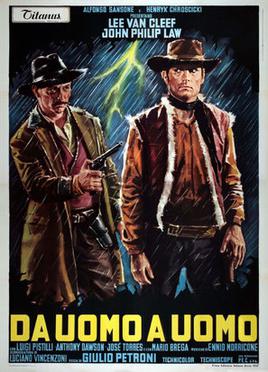
Death Rides a Horse is a 1967 Italian Spaghetti Western directed by Giulio Petroni, written by Luciano Vincenzoni and starring Lee Van Cleef and John Phillip Law.
One Life to Live is an American soap opera created by Agnes Nixon. During the 1980s, the show was broadcast on the ABC television network and episodes were an hour long.

The Messenger, released in the United States as I Am the Messenger, is a 2002 novel by Markus Zusak, and winner of the 2003 Children's Book Council of Australia Book of the Year Award. The story is written from the perspective of the protagonist, taxi driver Ed Kennedy, whose journey begins after he stops a robbery and receives a playing card in the mail.

Arthur Raymond "Doc" Barker was an American criminal, the son of Ma Barker and a member of the Barker-Karpis gang, founded by his brother Fred Barker and Alvin Karpis. Barker was typically called on for violent action, while Fred and Karpis planned the gang's crimes. He was arrested and convicted of kidnapping in 1935. Sent to Alcatraz Federal Penitentiary in 1936, he was killed three years later while attempting to escape.

Westward Ho is a 1935 American Western film directed by Robert N. Bradbury and starring John Wayne and Sheila Bromley. It was released by the recently created Republic Pictures and was produced by Paul Malvern, who had previously produced several of Wayne's Westerns under the Lonestar Productions division of Monogram Pictures. Many consider the film among the earliest revisionist Westerns.
The Reno Gang, also known as the Reno Brothers Gang and The Jackson Thieves, were a group of criminals that operated in the Midwestern United States during and just after the American Civil War. Though short-lived, the gang carried out the first three peacetime train robberies in U.S. history. Most of the stolen money was never recovered.
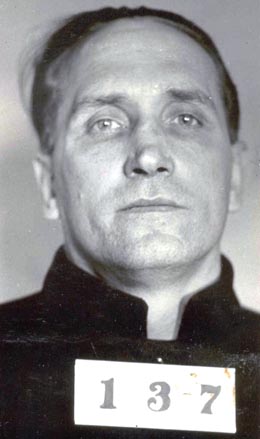
Albert Lawrence Bates was an American bank robber and burglar during the 1920s and 1930s. He used a number of different aliases during his criminal career including George Davis, George Harris and J.B. King. He was the longtime partner of George "Machine Gun" Kelly. He also took part in the kidnapping of oil magnate Charles Urschel in July 1933.
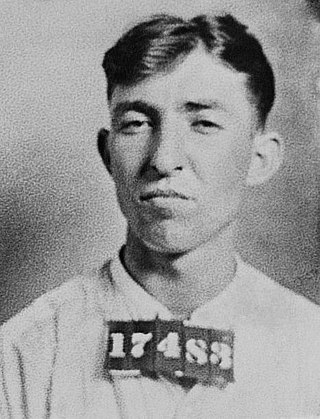
Harold Eugene "Eddie" Green was an American bank robber and Depression-era outlaw during the 1930s, best known as a member of the John Dillinger gang. He was also associated with Frank "Jelly" Nash, Volney Davis and the Barker-Karpis Gang in his early career.
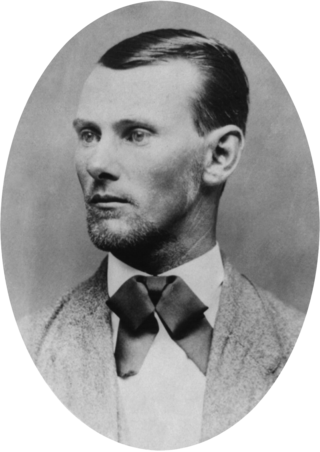
Jesse Woodson James was an American outlaw, bank and train robber, guerrilla and leader of the James–Younger Gang. Raised in the "Little Dixie" area of Missouri, James and his family maintained strong Southern sympathies. He and his brother Frank James joined pro-Confederate guerrillas known as "bushwhackers" operating in Missouri and Kansas during the American Civil War. As followers of William Quantrill and "Bloody Bill" Anderson, they were accused of committing atrocities against Union soldiers and civilian abolitionists, including the Centralia Massacre in 1864.
Wilbur Underhill Jr., often called "Mad Dog" or the "Tri-State Terror", was an American criminal, burglar, bank robber and Depression-era outlaw. He was one of the most wanted bandits in Oklahoma during the 1920s and 1930s and co-led a gang with Harvey Bailey that included many fellow Cookson Hills outlaws including Jim Clark, Ed Davis and Robert "Big Bob" Brady.

The Barker–Karpis Gang was one of the longest-lived criminal gangs during the Depression Era, spanning from 1931 to 1935. The gang was founded by Fred Barker and Alvin Karpis, and later joined by Fred's brother Arthur "Doc" Barker. Along with the three core members, the gang's network spanned up to 25 members at one point.
















